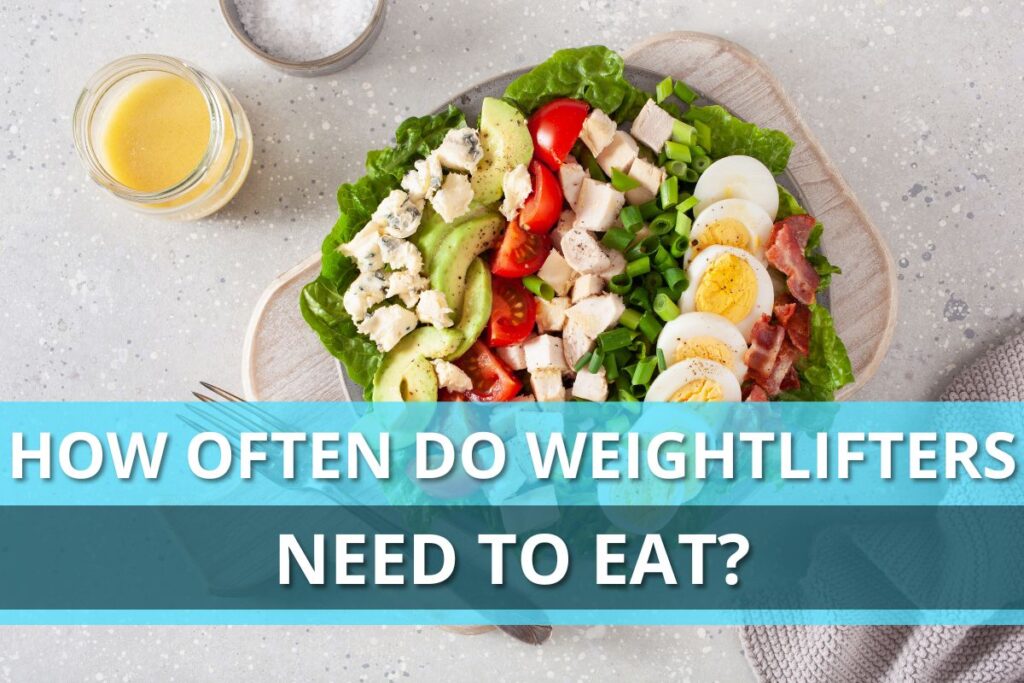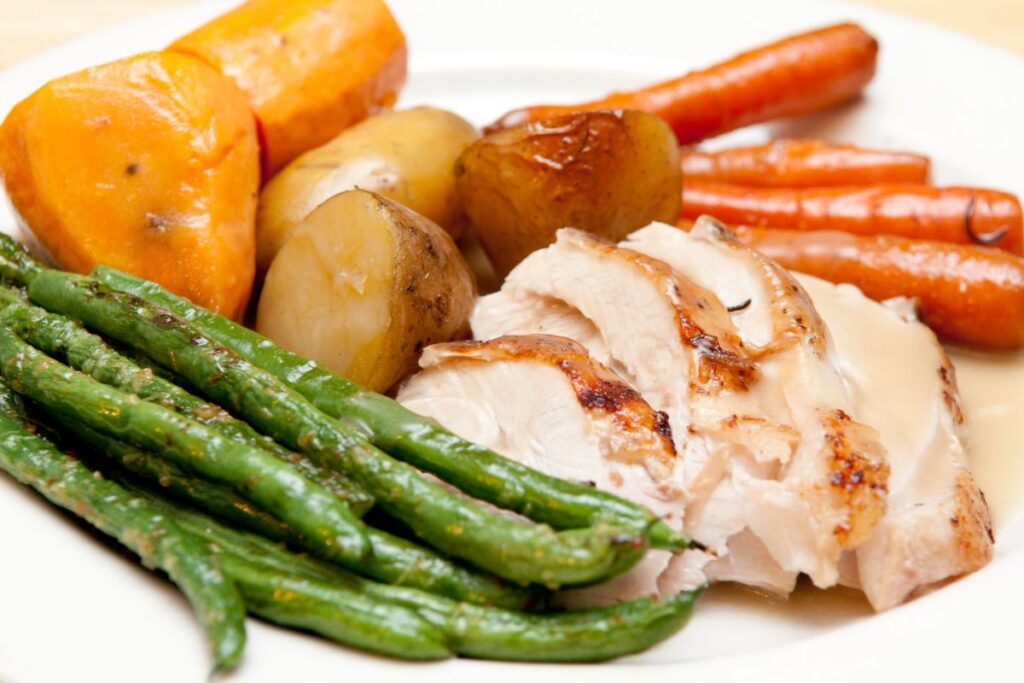How Often Do Weightlifters Need To Eat?
Author:
Unlock your full potential by engaging with our experts and community! Have questions about your fitness journey or looking for expert advice on weightlifting techniques? Don’t hesitate — leave a comment below and Sergii Putsov will provide a personalized answer and insights to help you reach your goals.
Torokhtiy is reader-supported. Some links are affiliate links, and we may earn a commission at no extra cost to you. See our disclosure page for details.

Nutrition plays a very important role for athletes and helps to solve 3 tasks at once: provision of fuel for training, recovery after heavy training, as well as maintenance of adaptation changes, including skeletal muscle hypertrophy. The question arises: does the frequency of meals affect training efficiency, recovery, muscle growth, and other indicators of weightlifters?
The absolute majority of researches that have studied the effects of eating frequency have focused on people who were obese or overweight. Besides, since these people were not professional athletes or at least fans, only the impact on weight loss and body composition was studied.
If to consider the influence of frequency of meals on a fat percent decrease in a people’s body with excess or normal weight, on the available data if it is, only minimum. When total calorie intake was strictly controlled, the amount of lost body weight was not significantly different, even when 1 meal and 9 meals per day were compared.
Frequent and fractional nutrition is not thought to accelerate metabolism. This is confirmed by research data. The frequency of meals does not significantly affect the loss of total body weight, fat loss, or fat-free mass. Everything should be dictated by the preferences of each individual. The difference, if any, is so minor that it is devoid of any practical value. If it is comfortable for someone to eat 3 times a day and for other – 6 times, there’s no problem with that. In any case, the primary task is to observe the diet regime, as well as to obtain the necessary amount of calories, proteins, fats, and carbohydrates.
You may like it:
As for athletes and physically active people, there is very little research where the impact of the frequency of meals on body composition, adaptation to training, and physical workability was studied. The question of the meal frequency influence on the athletes’ body composition remains open.
Interestingly, for 2011 there are no recommendations in nutrition manual for strength athletes regarding optimal food intake frequency. You will not also find special recommendations in the combined position on nutrition for athletes from Dietitians of Canada, the Academy of Nutrition and Dietetics, and the American College of Sports Medicine.
However, nutrition manuals for athletes, including power ones, focus on two factors:
- Total needs for calories, proteins, carbohydrates, and fats.
- Timing of nutrient consumption before, during and after training.
The goal is to optimize training efficiency and recovery, as well as to achieve the target body weight/composition.
Factor #1 – Needs for calories, proteins, fats, and carbs

I will give the recommended consumption rates of protein, carbs, and fats for power athletes:
- The caloric content is calculated in such a way as to cover energy needs, as well as to place in it the necessary amount of protein, carbs, and fats. The goal of the athlete (gain mass, reduce the percentage of fat, retain the current weight/composition of the body) and his current training cycle are also taken into account.
- The normocaloric or hypercaloric nutrition requires 1.6-1.8 g of protein per 1 kg of body weight. If the goal is to lose weight/reduce the fat percentage, the need for protein increases to 2-2.4 g per 1 kg of body weight. The stronger the calorie deficiency and lower the percentage of body fat, the closer you need to focus on the upper range of protein consumption. The increased protein consumption (more than 2 g/kg) is also required during short periods of increased training intensity.
- Depending on the training cycle and the purpose of the athlete (weight gain, a fat percentage reduction, weight retention), the carbohydrate needs are about 4-7 grams per 1 kg of body weight.
- Fat requirements range from 20 to 35% of the total calorie content of the diet, or 0.8-1.5 g/kg. One can only lower below 20% for very short periods.
I want to emphasize that these norms are only indicative, especially for carbohydrates. All of us differ in body size and physical activity in addition to training, each of us has our own goals. Therefore, everything should be selected individually for each.
Factor #2 – Meal Timing

The general recommendations are to distribute the protein evenly, for example, for 3-6 meals. For maximum efficiency on training and accelerated recovery, it is also recommended to consume the largest portion of carbohydrates before and after training. This will support the glycogen muscle depots filled and restore glycogen faster after training.
For the maximum synthesis of muscle protein in response to strength training, it takes about 20-30 g of protein per 1 meal. Such a portion of high-quality protein provides us with 10-15 g of essential amino acids. If we count by 1 kg of body weight, then we will get about 0.25-0.3 g protein/kg per meal. The power athletes of impressive sizes for 1 meal are allowed to consume up to 40 or more grams of protein. However, it is important to understand that more than 40 g of protein per meal will no longer enhance muscle protein synthesis.
The total amount of protein per day is recommended to be distributed into about the same portions and consumed every 3-4 hours. It is also recommended to consume protein both before and after training to optimize body composition and increase adaptation to the training sessions. Although there are nuances, for example, in how many hours before training the athlete ate a portion of protein.
Considering all information, the best frequency of meals is the one that will allow you to consume the necessary amount of calories and macronutrients, evenly distributing protein throughout the day. Depending on the needs for calories, macronutrients, and feelings from the gastrointestinal tract, there can be 3, or 6, or even more meals. After all, not the largest athlete weighing 75 kg will be able without problems to fit the needs in 4 meals. It will be much more difficult for a man weighing 100 kg with very high activity in addition to training to put a large number of calories and macronutrients in the same 4 meals. As you can see, there is no universal answer.
You might be interested in:
Why Trust Us?
With over 20 years in Olympic weightlifting, strength training, nutrition coaching, and general fitness our team does its best to provide the audience with ultimate support and meet the needs and requirements of advanced athletes and professional lifters, as well as people who strive to open new opportunities and develop their physical capabilities with us.
By trusting the recommendations of our certified experts in coaching, nutrition, and sports training programming, as well as scientific consultants, and physiotherapists, we provide you with thorough, well-considered, and scientifically proven content. All the information given in the articles concerning workout programming, separate exercises, and athletic performance, in general, is based on verified data.
The product testing process is described in more detail here.
Author: Sergii Putsov
Head of Sport Science, PhD
Best Results: Snatch – 165 kg,
C&J – 200 kg
Sergii Putsov, Ph.D., is a former professional weightlifter and National team member, achieving multiple medals in the 94 kg weight category at national competitions. With a Master’s degree in “Olympic & Professional Sport Training” and a Sport Science Ph.D. from the International Olympic Academy, Greece, Sergii now leads as the Head of Sport Science. He specializes in designing training programs, writing insightful blog articles, providing live commentary at international weightlifting events, and conducting educational seminars worldwide alongside Olympic weightlifting expert Oleksiy Torokhtiy.




Still have questions after reading our article? Unlock your full potential by engaging with our experts and community! Don’t hesitate — leave a comment below and Sergii Putsov will provide a personalized answer and insights to help you reach your goals.